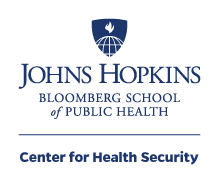Multilateral Strategic Dialogue on Biosecurity
Singapore, Malaysia, Indonesia, United States
With Participating Observers from Thailand and Philippines
3-5 April 2017
United States Institute of Peace, Washington, DC
The Johns Hopkins Center for Health Security hosted a multilateral biosecurity dialogue meeting with subject matter experts from Singapore, Malaysia, Indonesia and the United States. This is the second year of the multilateral dialogue, and observers from Philippines and Thailand were added to build upon the success of previous dialogues through expanding the geographic representation. The dialogue addressed the health and security impact of naturally occurring, accidental, and deliberate infectious disease events; high-containment laboratory biosafety and biosecurity; the potential benefits of and security challenges posed by emerging biotechnology and dual-use science; and the difficulties of rapidly identifying and responding to regional health emergencies. The participants represented a variety of fields relevant to biosecurity, including public health, clinical medicine for both human and animal health, defense, homeland security/home affairs, WMD nonproliferation, international relations and policy, and the media. This project was supported by the Project on Advanced Systems and Concepts for Countering WMDs and the Defense Threat Reduction Agency at the US Department of Defense.
Agenda
Day 1 - April 3, 2017
8:45 – 9:30 Welcome, Goals for Meeting, and Introductions
Tom INGLESBY, Director, Johns Hopkins Center for Health Security
Anita CICERO, JD, Deputy Director, Johns Hopkins Center for Health Security
9:30 – 10:45 Dialogue Session One: What are your country’s current biosecurity priorities?
For the purposes of this dialogue, “biosecurity” refers to the actions, policies, and programs that countries implement to prevent and respond to the greatest biological threats facing their nation—including natural, deliberate, and accidental events.
During this opening dialogue session, we will hear from each country about their current concerns, greatest strengths, and most serious challenges related to national biosecurity. What are the greatest biosecurity concerns in your country? Are current geopolitical issues affecting or likely to affect your country’s biosecurity priorities? What is the national reaction to the number of avian flu outbreaks and the regional proliferation of strains seen this year? Is your government concerned about the threat posed by either terrorist or nation-level use of biological weapons? In your view, is your country allocating adequate resources for biosecurity, considering the relative threats posed by potential outbreaks, lab accidents, and other biological risks? If not, why not?<
A representative from each of the participating countries will provide opening remarks (5 minutes) on this topic, followed by a discussion by all participants.
Opening Remarks: Ken BERNARD, Daniel TJEN, Michelle YAP, and Zalini YUNUS
10:45 – 11:00 Coffee/Tea Break
11:00 – 11:25 Philippines Observer Presentation with Follow-on Group Discussion
Biosafety and Biosecurity in the Philippines: Current Challenges and Opportunities
Presentation by Irma MAKALINAO, Professor of Pharmacology and Toxicology, College of Medicine, University of the Philippines, Manila
11:25 – 12:15 Thailand Observer Presentations with Follow-on Group Discussion
Recent Policy Movements and Regional/Global Networking for Health Security and AMR
Presentation by Suwit WIBULPOLPRASERT, Senior Advisor to the Thailand Ministry of Health and Former Vice Minister of Health, Thailand
Emerging Infectious Diseases and Other Biological Threats in Thailand and the Region
Presentation by Tawee CHOTPITAYASUNONDH, Faculty of Tropical Medicine and Hygiene, Department of Tropical Pediatrics, Mahidol University
12:15 – 1:30 Lunch
1:30 – 2:30 Dialogue Session Two: How can countries best utilize advanced science and technology to develop early warning for and response to biosecurity threats?
The rapid pace of progress in the biology and biotechnology sectors has the potential to yield advanced products and processes that can improve the health of populations worldwide. How can these advancements be leveraged to rapidly develop solutions to new and unanticipated problems? How can the public and private sectors best engage in this arena to support creative advancements—including medical countermeasures, diagnostics, and surveillance systems—that can affect a broad range of known and unknown biological threats?
What disease surveillance and warning systems are most effective in your country, and what are the greatest surveillance challenges? What investments are being made to address deficits in surveillance? What are your near-term priorities for surveillance?
Opening Remarks: Jeremiah CHNG, CHONG Chee Kheong, Noreen HYNES, and Pratiwi SUDARMONO
2:45 Shuttle departs for the White House
3:30 – 5:00 White House Discussion on Biosecurity
Hosted by Hillary CARTER, Director for Countering Biological Threats, White House National Security Council
5:00 Meeting adjourns
Day 2 - April 4, 2017
8:45 – 9:15 Roundtable Discussion: The Financial Costs of Biosecurity
Discussion led by CHEN Chaw Min, Secretary General of Health, Ministry of Health, Malaysia
9:15 – 10:45 Dialogue Session Three: How can we prevent and respond to biosecurity threats in laboratories?
Advances in the life sciences are continuing at a brisk pace and have opened the door to promising new discoveries that bring with them the potential to improve the health and safety of the public, agriculture, animals, the environment, and national security. Technological advances in molecular biology and biotechnology will play an increasingly important role in the growth of national economies.
Despite these benefits, certain types of research conducted for benevolent reasons could be used for harmful purposes and present risks to national, regional, and global security. Funders of life sciences research and the institutions and scientists who conduct life sciences research have a shared responsibility to establish systems to prevent misuse. How does your country work to instill a culture of responsibility in labs? What strategies have been successful in establishing and maintaining buy-in from your scientific community without making them feel that they are not trusted?
In your country, how and to whom would laboratorians report concerns about potential misuse? Does your government reach out to laboratorians to make them aware of potential misuse or educate them on potential indications of misuse? In your country, what is law enforcement’s general level of awareness about biological threats? Does your country have companies that provide gene synthesis services, and, if so, do they have procedures in place to screen requests and customers? Who do companies contact if their screening processes identify potentially high-risk requests or customers?
A representative from each of the 4 countries will provide opening remarks (5 minutes) on this topic, followed by a discussion by all participants.
Opening Remarks: Julie FISCHER, Daniel TJEN, Michelle YAP, and Zalini YUNUS
11:00 Bus departs for Fort Detrick
1:00 – 2:30 Site Visit at IRF
The Integrated Research Facility (IRF), operated by the National Institute of Allergy and Infectious Diseases (NIAID), is one of several facilities that comprise the National Interagency Biodefense Campus at Fort Detrick. IRF provides high-containment facilities (including advanced BSL-4 laboratories) to support research on the prevention and treatment of human diseases. IRF incorporated specially designed imaging equipment into planning and construction of the facilities to enable researchers to study disease progression in a range of animal models in ways not previously possible.
3:30 – 5:00 Site Visit at USAMRIID
The United States Army Medical Research Institute for Infectious Diseases (USAMRIID), established in 1969, is one of the world’s premier infectious disease and biodefense research facilities. USAMRIID operates high-containment research laboratories to investigate a wide range of deliberate and naturally occurring biological threats. While the primary mission is to protect US military personnel from biological threats, research at USAMRIID has made critical contributions to the development and testing of countless medical countermeasures and diagnostics that benefit both military and civilian populations.
5:00 Meeting Adjourns
Day 3 - April 5, 2017
9:00 – 10:00 Presentation: The Biological Weapons Convention: Recovering from the 8th Review Conference
Presentation by Christopher PARK, Director of Biological Policy, US Department of State
10:00-10:45 Keynote Address: Biosecurity Priorities in the Time Ahead
Address by Robert KADLEC, Deputy Staff Director, US Senate Select Committee on Intelligence, and Former Senior Director for Biodefense, White House National Security Council
10:45 – 11:00 Coffee/Tea Break
11:00 – 12:00 Dialogue Session Four: What are the priorities for new regional coordination activities in Southeast Asia?
Exchange of information occurs on an informal basis between peers working on biosecurity matters in countries across Southeast Asia. On what topics is such information exchange most robust? Where is it most lacking? Are there untapped opportunities to increase regional initiatives on biosecurity and, if so, in what areas? What are the most important problems that would require regional coordination (eg, development and stockpiling of medical countermeasures and personal protective equipment; data sharing for surveillance/early warning systems, epidemiological investigations, and pathogen sequencing; labs and lab network; emergency operations centers)? What regional capabilities would you want? What types of outbreaks, terrorist events, or laboratory accidents—if they were to occur in the region—should spur regional coordination? Should regional coordination occur only for emergencies, or should it serve even routine biosecurity needs? Countries in the Southeast Asian region have come together in the United Dengue initiative, which is committed to establishing a local surveillance system and facilitating and developing mutually beneficial cooperation for dengue control. Are there other desired regional initiatives that would be practically and politically feasible?
Opening Remarks: Seth CARUS, CHONG Chee Kheong, KWA Chong Guan, and Ben RIMBA
12:00 – 1:00 Lunch
1:00 – 1:45 Presentation: Public and Media Reaction to Epidemics and Crises in Indonesia and Southeast Asia
Presentation by Endy M. BAYUNI, Editor-in-Chief, The Jakarta Post
1:45 – 2:00 Coffee/Tea Break
2:00 – 4:00 Group Discussion on Creation of Joint Statement or Peer-Reviewed Journal Article
- Purpose
- Possible Venue and Audience for Piece
- Use of Joint Statement or Article
- Potential Content of Piece
- Process for Creation and Approval
4:00 – 4:30 Group Discussion of Agenda for Next Dialogue Session and Next Steps
4:30 Meeting Adjourns
Meeting Participants
Endy M. BAYUNI
Editor-in-Chief, The Jakarta Post, Indonesia
Kenneth BERNARD, MD
USPHS (ret.)
Advisor, National Security and Biodefense
W. Seth CARUS, PhD
Distinguished Research Fellow, Center for the Study of Weapons of Mass Destruction, National Defense University
CHEN Chaw Min, PhD
Secretary General, Ministry of Health, Malaysia
LTC Jeremiah CHNG, MD, MPH
Head, Singapore Armed Forces Biodefence Centre
CHONG Chee Kheong, PhD, MPH
Director, Disease Control Divisions, Ministry of Health, Malaysia
Tawee CHOTPITAYASUNONDH, MD
Associate Professor (Honour) and Senior Medical Officer, Queen Sirikit National Institute of Child Health, Thailand
Anita CICERO, JD
Deputy Director, Johns Hopkins Center for Health Security
Julie E. FISCHER, PhD
Co-Director, Center for Global Health Science and Security, Georgetown University Medical Center
Gigi GRONVALL, PhD
Senior Associate, Johns Hopkins Center for Health Security
William P. HOSTYN, MS
Director, Advisory Committees and Programs Office, Defense Threat Reduction Agency, US Department of Defense
Noreen A. HYNES, MD, MPH
Director, Geographic Medicine Center of the Division of Infectious Diseases, Johns Hopkins University
Tom INGLESBY, MD
Director, Johns Hopkins Center for Health Security
KWA Chong Guan, MA
Senior Fellow, S. Rajaratnam School of International Studies, Singapore
Irma R. MAKALINAO, MD, MA, FPPS, FPSCOT
Professor, Department of Pharmacology and Toxicology, University of the Philippines Manila College of Medicine
MG Ben RIMBA, MD, MHA
Military Medicine, Indonesian Defense Force
Angkana SOMMANUSTWEECHAI, DVM
International Health Policy Program, Ministry of Public Health, Thailand
Pratiwi pujilestari SUDARMONO, MD, PhD
Vice Dean and Professor, Faculty of Medicine, Universitas Indonesia
Daniel TJEN, MD, SpS
Chief Medical Officer, Mayapada Healthcare Group, Indonesia
Suwit WIBULPOLPRASERT, MD
International Health Policy Program Foundation, Ministry of Public Health, Thailand
Michelle YAP
Senior Assistant Director, Science & Technology Assessment Task Force, Office of the Chief Science & Technology Officer, Ministry of Home Affairs, Singapore
Zalini Binti YUNUS, PhD
Senior Director, Biological & Toxins Weapons Convention Nucleus, Science & Technology Research Institute for Defence, Ministry of Defence, Malaysia





